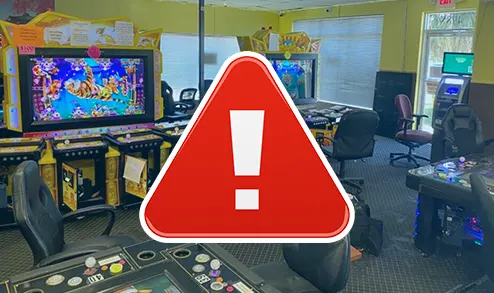 Florida Gaming Control Commission experts warn residents that adult arcade establishments that offer slot machines are illegal and offer zero consumer protection. Besides, there is no guarantee that the games are fair and the operator will not disappear with the consumers’ money.
Florida Gaming Control Commission experts warn residents that adult arcade establishments that offer slot machines are illegal and offer zero consumer protection. Besides, there is no guarantee that the games are fair and the operator will not disappear with the consumers’ money.
The gambling regulator noted that those who operate slot machines outside licensed gambling venues may face a fine of up to $10k per machine, while the illegal slot machines are subject to confiscation. The Florida Gaming Control Commission recently issued warnings to over 20 businesses in Southwest Florida.
Florida Residents Must Be Aware of the Risks of Playing at Illegal Gambling Venues
Eric Carr, director of external affairs with the Florida Gaming Control Commission, said that slot machines operating outside a casino are illegal. He added that the only legal casinos in Florida are those owned by the Seminole Tribe of Florida and the Miccosukee Tribe of Indians of Florida. Carr explained that legal casinos must offer a payout of no less than 85%. On the other hand, illegal establishments do not comply with this requirement, and there is no consumer protection.
Carr noted that the gambling regulator has a portal where everyone who has information about illegal gambling information can share it anonymously, and the regulator will check the tip. Under the provisions of Florida’s gambling law, everyone caught operating illegal slot machines will be fined $10k per machine, and the machines will be seized.
The Florida Gaming Control Commission revealed that 20 businesses in Southwest Florida recently received warning messages. But this is not the first time this has happened. At the end of April, officers from the Florida Gaming Control Commission issued warnings to six Leon County venues offering illegal slot machines. The sites were notified that they must cease operations, or else they would be fined.
Business Owners and Consumers Must Be Educated on the Legalities of Slot Machines
Carl Herold, director of gaming enforcement with The Florida Gaming Control Commission, said that some business owners were unaware that these machines are illegal. He added that it is important to educate them on the legality of these machines. He also noted that the regulator cannot force owners of such venues that illegally offer slot machines to pay out players’ winnings.
Herold explained that not all establishments are uncompliant. For example, an establishment like Dave and Busters does not violate the law as it provides players with the opportunity to win tickets instead of cash prizes. He said that some businesses voluntarily remove the illegal slot machines when they receive a warning notice. Those who continue hosting such machines even after getting a warning letter are being investigated.
Herold refused to specify when exactly uncompliant businesses will be investigated as they could move to a different location. He also noted that the state is losing money from illegal gambling activities. Licensed casinos pay a state tax of 35% on their net profits, and the money goes to Florida’s Bright Futures Scholarship Program. Herold said illegal gambling enhances crime, and people should fight against it.
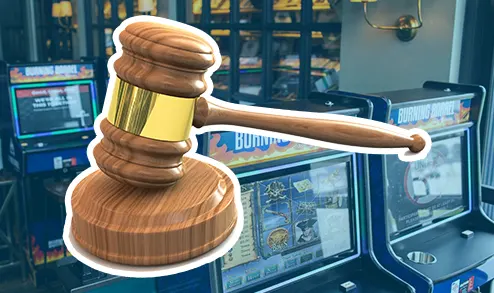 Prominent Technologies, a Pennsylvania-based company that manufactures and operates “skill-based” machines, along with other plaintiffs, filed a lawsuit on Tuesday against the state of Kentucky, claiming that the ban on the so-called “skill-based” machines is unconstitutional. The plaintiffs also asked a Jefferson Circuit Court judge to block Attorney General Daniel Cameron’s attempts to enforce House Bill 594, under which “skill game” machines are illegal, and establishments operating such games can face a hefty fine of $250k per machine.
Prominent Technologies, a Pennsylvania-based company that manufactures and operates “skill-based” machines, along with other plaintiffs, filed a lawsuit on Tuesday against the state of Kentucky, claiming that the ban on the so-called “skill-based” machines is unconstitutional. The plaintiffs also asked a Jefferson Circuit Court judge to block Attorney General Daniel Cameron’s attempts to enforce House Bill 594, under which “skill game” machines are illegal, and establishments operating such games can face a hefty fine of $250k per machine. 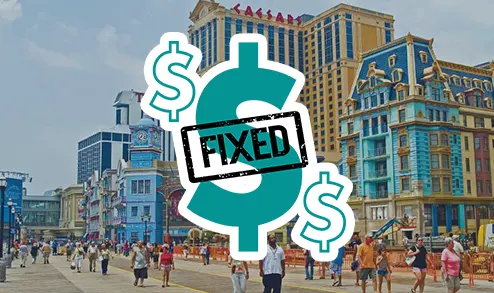 Customers are to legally challenge Caesars Entertainment Inc, MGM Resorts International, and other casino-hotel operators in Atlantic City, New Jersey, for market manipulation, which is against U.S. antitrust law. Two New Jersey residents filed a 109-page lawsuit on Tuesday against Hard Rock International and Cendyn Group LLC, a Florida-based hospitality technology company, which is allegedly at the core of the conspiracy. The defendants used Cendyn’s platform to set higher room rates for their hotels, including Harrah’s Atlantic City, Bally’s Atlantic City, and Borgata.
Customers are to legally challenge Caesars Entertainment Inc, MGM Resorts International, and other casino-hotel operators in Atlantic City, New Jersey, for market manipulation, which is against U.S. antitrust law. Two New Jersey residents filed a 109-page lawsuit on Tuesday against Hard Rock International and Cendyn Group LLC, a Florida-based hospitality technology company, which is allegedly at the core of the conspiracy. The defendants used Cendyn’s platform to set higher room rates for their hotels, including Harrah’s Atlantic City, Bally’s Atlantic City, and Borgata. 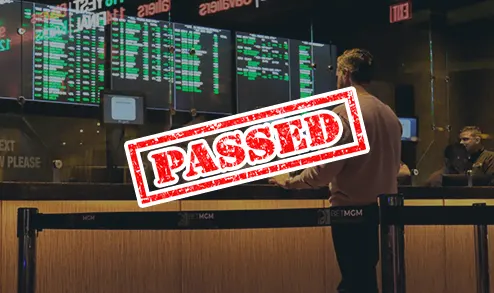 Vermont inches closer to legalized sports betting after the House approved the amended version of a sports betting bill Tuesday morning. The future of the legislation is now in the hands of Governor Phil Scott, who has five days to sign or veto the bill. If he does not act on the bill within the designated timeframe, the legislation would be considered approved. Up to six betting platforms would be authorized to operate in the Green Mountain State, starting January 1, 2024.
Vermont inches closer to legalized sports betting after the House approved the amended version of a sports betting bill Tuesday morning. The future of the legislation is now in the hands of Governor Phil Scott, who has five days to sign or veto the bill. If he does not act on the bill within the designated timeframe, the legislation would be considered approved. Up to six betting platforms would be authorized to operate in the Green Mountain State, starting January 1, 2024. 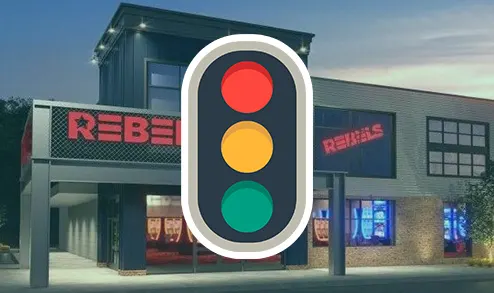 Before considering a proposed charitable casino and restaurant on Miracle Mile, city officials want to see additional traffic data. On Monday, the Planning Board was scheduled to hold a public hearing in Lebanon, New Hampshire, but decided to postpone it until June 12. The local planning board rescheduled the hearing for the third time since February in order to give city officials more time to review and discuss the proposal.
Before considering a proposed charitable casino and restaurant on Miracle Mile, city officials want to see additional traffic data. On Monday, the Planning Board was scheduled to hold a public hearing in Lebanon, New Hampshire, but decided to postpone it until June 12. The local planning board rescheduled the hearing for the third time since February in order to give city officials more time to review and discuss the proposal. 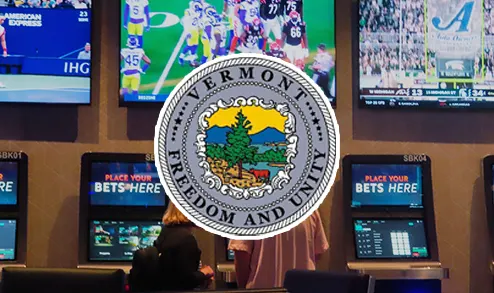 Many Vermonters expressed their opinion regarding a recent legislative effort, which would legalize sports betting in the state if approved. It seems that the majority of the residents of the Green Mountain State embrace the idea of regulating the market as it would add excitement to sporting events, generate more tax revenues for the state, and curb illegal gambling activities.
Many Vermonters expressed their opinion regarding a recent legislative effort, which would legalize sports betting in the state if approved. It seems that the majority of the residents of the Green Mountain State embrace the idea of regulating the market as it would add excitement to sporting events, generate more tax revenues for the state, and curb illegal gambling activities.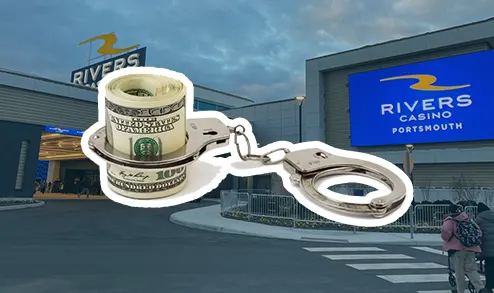 Rivers Casino Portsmouth has become the first gambling venue to be fined by the Virginia Lottery Board. At the end of last week, Rivers Casino Portsmouth, owned and operated by Chicago’s Rush Street Gaming, was fined $275k for alleged gambling violations in January and February. Rivers Casino agreed to pay the fine, avoiding a public hearing on the matter that could reveal other infractions.
Rivers Casino Portsmouth has become the first gambling venue to be fined by the Virginia Lottery Board. At the end of last week, Rivers Casino Portsmouth, owned and operated by Chicago’s Rush Street Gaming, was fined $275k for alleged gambling violations in January and February. Rivers Casino agreed to pay the fine, avoiding a public hearing on the matter that could reveal other infractions.  Alabama baseball coach Brad Bohannon was fired on Thursday following an ESPN report about suspicious wagering activity on the team’s games. Alabama athletic director Greg Bryne said the school decided to part ways with Bohannon, who allegedly violated the standards and responsibilities that every University employee should respect. While the investigation is underway, New Jersey, Ohio, and Pennsylvania prohibit bookmakers from taking wagers on the Crimson Tide’s games.
Alabama baseball coach Brad Bohannon was fired on Thursday following an ESPN report about suspicious wagering activity on the team’s games. Alabama athletic director Greg Bryne said the school decided to part ways with Bohannon, who allegedly violated the standards and responsibilities that every University employee should respect. While the investigation is underway, New Jersey, Ohio, and Pennsylvania prohibit bookmakers from taking wagers on the Crimson Tide’s games. 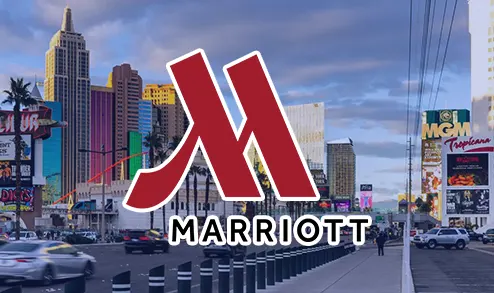 This Wednesday, the Nevada Gaming Control Board unanimously recommended approval of a temporary gaming license for a pop-up casino located at the former site of The Beach, at Paradise Road and Convention Center Drive. The gambling venue will host 16 slot machines and will exist only for eight hours, starting from 6 a.m. on May 23.
This Wednesday, the Nevada Gaming Control Board unanimously recommended approval of a temporary gaming license for a pop-up casino located at the former site of The Beach, at Paradise Road and Convention Center Drive. The gambling venue will host 16 slot machines and will exist only for eight hours, starting from 6 a.m. on May 23. The Seneca Nation announced that it is to hold various public initiatives throughout May in a bid to win community support and secure a new gaming compact with the Empire State. If the tribe manages to convince the state to renew its gaming compact, which expires in December, its three gambling properties in Salamanca, Buffalo, and Niagara Falls will continue operating. The initiatives will continue for a month, kicking off on Thursday at Seneca Niagara Resort & Casino, where the public can sign support letters from 11 a.m. to 3 p.m. in the resort’s hotel lobby.
The Seneca Nation announced that it is to hold various public initiatives throughout May in a bid to win community support and secure a new gaming compact with the Empire State. If the tribe manages to convince the state to renew its gaming compact, which expires in December, its three gambling properties in Salamanca, Buffalo, and Niagara Falls will continue operating. The initiatives will continue for a month, kicking off on Thursday at Seneca Niagara Resort & Casino, where the public can sign support letters from 11 a.m. to 3 p.m. in the resort’s hotel lobby.